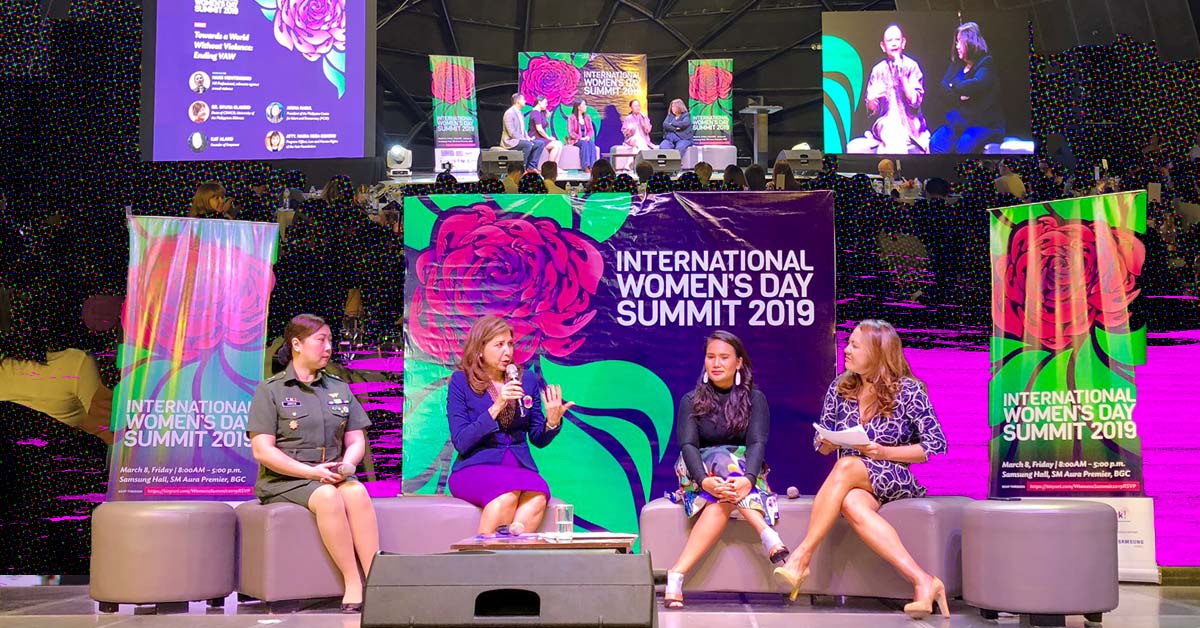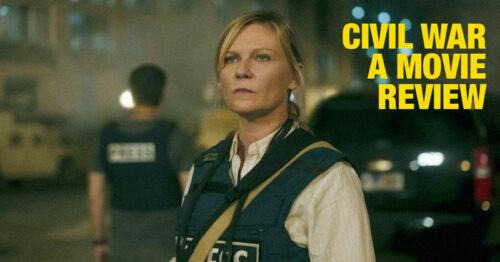A recap of the most important topics covered as well as insights on how we can move forward with the help of not just fellow women, but the men, too
The Women’s Day Summit 2019 was a one-day, open-for-all event organized by the Office of the Vice President and Samahan ng mga Pilipina para sa Reporma at Kaunlaran (SPARK!) Philippines, held last Friday, March 8, at the SM Aura Samsung Hall for the celebration of the International Women’s Day celebration. The event featured several speeches from respectable personalities, most notably Vice President Leni Robredo herself. In her keynote speech, she talked about the importance of economic empowerment for women.
“Economic empowerment is the first step to real empowerment,” she explained. “For every woman that is economically independent, an entire family has the chance to break free from poverty.”
While VP Robredo brought forth the discussion of empowering women economically, which Swedish Ambassador Harald Fries also briefly touched in his opening remarks, the summit aimed toward a multi-faceted approach to empowerment. The main highlights of the event were the three panel discussions, each delving into a vital aspect of a genuinely holistic definition of women empowerment.
RELATED: She Talks Asia Is Back. This Year: We Are Enough
The sociocultural aspect: putting an end on gender-based violence
https://www.instagram.com/p/Bui1KSDFNIt/
The first, and arguably the most engaging, discussion shed light on violence against women. Moderated by Hans Montenegro, the first panel was comprised of articulate, insightful women known for their contributions in ending VAW: Kat Alano of Empower, Dr. Sylvia Claudio of UP Diliman College of Social Work and Community Development, Amina Rasul of Philippine Center for Islam and Democracy and Atty. Maria Roda Cisnero of The Asia Foundation.
Hans opened the panel discussion with a commentary on how “we graduated, and not in a good way, from male locker room talk and banter around drinking tables to world and national leaders who don’t just freely talk about their actual views on women—they advocate, through their words, actual violence against women.”
RELATED: What Is Violence Against Women?
When asked about how to “combat this widespread malignant culture,” Dr. Claudio emphasized on how powerful words can be. The same way that words serve as the very means to spread this despicable culture, words can also be weaponized as counterattack: by calling out the people who perpetuate violence. She further notes that the longer-term to end misogynistic behavior is to continue lobbying for a change in the existing culture.
Following this, Kat Alano raised a very compelling point. The former actor and staunch advocate noted that this “misogyny in our leadership” is simply “a figurehead” for an even greater problem. Alano argues that this attitude is rooted on the misogyny found in the language of the media that we consume. She cites examples of foreign TV shows, pointing out the obvious presence of misogynistic remarks and acts of sexual assault simplified as humorous. It is undeniable that Filipino TV shows and movies, both old and new, use the similar tone of offensive comedy, and Alano believes that the generations’ worth of being exposed to such kind of media took a depressing toll on us.
Representing the Muslim minority group, Amina Rasul highly encouraged the attendees to look at the current state of war-stricken areas in Mindanao where “violence against women takes on a very different dimension,” albeit “not acknowledged by the majority.” Rape inside camps remain prevalent in these areas due to poor security, and oppression of children takes on the form of forced marriages. Noting the tentative regional BANGSAMORO government on its way to ratification, Rasul asked:
“In a world where misogyny, extreme orthodoxy, especially in areas in the Muslim world, how do we make sure that such ideas do not infect this new system that we are developing in the South so that we actually provide equality for everyone?”
More interesting topics were tackled within the timeframe of the panel discussion, such as why men seem to take female-initiated confrontations lightly, why men rape, how victim blaming can be resolved and why there are no laws covering “violence against men.”
RELATED: On Sexism in Sexual and Reproductive Health and Change on the Horizon
The economic aspect: teaching women to be economically empowered
Introduced by VP Robredo and Ambassador Harald Fries, economic empowerment was further tackled in the second panel, whose members come from different fields of practice, all working towards providing common women training in entrepreneurship and practicality: Dr. Natsy Africa-Verceles of UP Center for Women’s and Gender Studies, Jill Javiniar of Angat Buhay, entrepreneur Zarah Juan, Julia Newton-Howes of Investing on Women and Carmel Valencia of L’Oreal Philippines, with Sabrina Gacad serving as the moderator.
https://www.instagram.com/p/BujB4tolyuj/
The latter two panel discussions took a different format than the first, giving more time for the speakers to talk about their individual companies’ pursuits and accomplishments in relation to the subject of economic empowerment.
In her introduction, Dr. Africa-Verceles discussed the concept of feminist solidarity economics, which she explains can be utilized to forward women empowerment. It is an attempt to engender solidarity economics, which is the type of economics that “prioritizes human beings, needs of people and ecological stability over profit maximization.” Feminist solidarity economics addresses issues based on specific needs of women, including the issue of class.
An interesting question from the audience was on the topic of ensuring that women trained for entrepreneurial work will not be exploited. Dr. Africa-Verceles expressed her strong advocacy on “capacitat[ing] them enough to have them run, own and manage their own enterprise.” Valencia emphasized on the importance of “paying it forward”—which her company instills on their workshop graduates—by teaching the practicalities and principles they learned to other people.
The entire discussion echoes Fries’ note on why economic empowerment is significant for a nation: 100% progress will not be attained if only 50% of the resources is utilized.
The political aspect: working towards equal participation among genders
Finally, equal political participation for women was the third focal point. The last panel discussion featured successful women in male-dominated careers: Senator Risa Hontiveros, Ambassador Bita Rasoulian, Lt. Col. Jan Chavez-Arceo of the Armed Forces of the Philippines and Cherrie Atilano of AGREA.
https://www.instagram.com/p/Bui1UOVla0C/
Senator Hontiveros provided the foundation for the discussion with data on how the Philippines has managed to progress in terms of empowering women throughout the years, noting how we were ranked in the 2018 Global Gender Gap Report Economic Forum as the “most gender-equal country in Asia” and 9th among 149 countries. However, there remains one area where we have not made much progress yet and that is political empowerment. This area “measures the gap between men and women at the highest level of political decision making.” Hontiveros also emphasized on the involvement of men in “creating an equal world” and “improving the participation of women involves men.” She explained, “it will take the effort of all genders to bring the community forward.” Proper representation of all genders in political power gives an image of an ideal society. She ended her speech with the note: “[a] law isn’t just a tool for what can and cannot be done. It isn’t just a counting of what is. It’s a declaration of the world that could be. In my opinion, that lies at the very heart of an equal world.”
RELATED: Wonder Whiteboard Series: It’s A Girl Thing Manila 2018
Ambassador Rasoulian, Lt. Col. Chavez-Arceo and Atilano all shared their individual experiences that inspired them to take on the challenge of penetrating the male-dominated worlds of international diplomacy, military and national defense and agriculture. They talked about the process of breaking the gender barriers as well as the role of having their own strong support systems in the success of their chosen careers.
The International Women's Day Summit 2019 was a truly remarkable convention of like-minded men and women who are fighting for empowerment of womankind in this country, especially at a time where we deal with misogyny, violence and abuse headfirst; we need lifting more than ever. The summit could have been more accessible to the common Filipinas for whom it essentially was for. It could have made a stronger impact if panelists gave more emphasis on insights over reports of their achievements. Still, it was undoubtedly a success in terms of what the event set out to do in celebrating this year's Women's Day. The summit certainly has the potential to be a vital part of every year's commemoration and it is an event worth looking forward to in the coming years.
Words Elizabeth Deyro
Photo Austrian Embassy Manila (Twitter)
Art Alexandra Lara


















